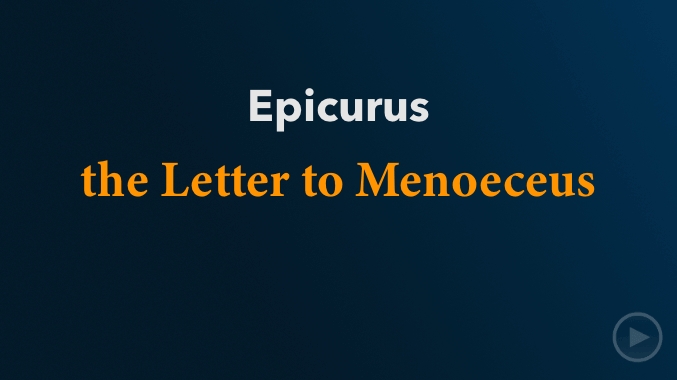• the Letter to Menoeceus •
• Epicurus •

About the “Letter to Menoeceus" of Epicurus
In Epicurus' Letter to Menoeceus, (Gr.: Ἐπίκουρος πρὸς Μενοικέα) τhe writer imparts wisdom on the pursuit of a happy life. Epicurus argues that the ultimate goal is happiness, achievable through the pursuit of pleasure and the avoidance of pain. He distinguishes between physical and mental pleasures, emphasizing the importance of simple pleasures and tranquility. Epicurus encourages moderation, friendship, and self-sufficiency, asserting that excessive desires lead to discontent. He dismisses the fear of death, viewing it as the absence of sensation. The letter underscores the significance of philosophical reflection in guiding one's choices, urging Menoeceus to cultivate virtues that lead to a fulfilled and serene life.
You can follow either of two English translations of the Epicurean "Letter to Menoeceus”, online at the newepicurean.com website, or the one at epicuros.gr.
The original Greek text can be found at Wikisource, though both original and translation are present the videobook.
about Epicurus
Epicurus (Gr.: Ἐπίκουρος) (341–270 BCE) was an ancient Greek philosopher and the founder of Epicureanism, a school of thought centered on the pursuit of happiness and tranquility through the cultivation of simple pleasures, mental tranquility, and the avoidance of unnecessary desires. Born on the island of Samos, Epicurus later established his philosophical school, the Garden, in Athens.
Rejecting the prevailing philosophical emphasis on abstract metaphysics, Epicurus focused on practical ethics. He believed that the highest good was ataraxia (Gr.: ἀταραξία, tranquility) and aponia (Gr.: ἀπονία, the absence of bodily pain). Epicurus argued that fear of the gods and fear of death were the primary sources of human anxiety and that understanding the natural world through empirical observation could alleviate these fears.
Epicurus also emphasized friendship as a crucial component of a happy life, viewing it as a source of support and pleasure. His teachings, transmitted through letters and writings, had a lasting influence on Western philosophy. Although often misunderstood as promoting hedonism in the modern sense, Epicureanism sought a measured and sustainable pursuit of pleasure to achieve a life of contentment and mental peace.
About the audio~videobook
 The recording contains the complete, unabridged Ancient Greek text of the Epicurean “Letter to Menoeceus”. The videobook shows the highlighted Greek text simultaneously with the reading.
After purchase you will be able to download the relevant file(s), containing the work in mp3 a/o mp4 format.
The recording contains the complete, unabridged Ancient Greek text of the Epicurean “Letter to Menoeceus”. The videobook shows the highlighted Greek text simultaneously with the reading.
After purchase you will be able to download the relevant file(s), containing the work in mp3 a/o mp4 format.
The videobook comes with (optional) captions in English. Other languages on request.
You can listen to the first five lines of the Epicurean “Letter to Menoeceus”, an audio sample of the present audiobook. Please, click on the play-button bellow and, if you wish, follow the Ancient Greek text lower on the page, or alternatively watch the video, which is provided with a quick translation in English. Thank you!
ΕΠΙΣΤΟΛΗ ΠΡΟΣ ΜΕΝΟΙΚΕΑ
Ἀλλ΄ οἱ πολλοὶ τὸν θάνατον ὁτὲ μὲν ὡς μέγιστον τῶν κακῶν φεύγουσιν͵ ὁτὲ δὲ ὡς ἀνάπαυσιν τῶν ἐν τῷ ζῆν κακῶν αἱροῦνται. ὁ δὲ σοφὸς οὔτε παραιτεῖται τὸ ζῆν οὔτε φοβεῖται τὸ μὴ ζῆν· οὔτε γὰρ αὐτῷ προσίσταται τὸ ζῆν οὔτε δοξάζεται κακὸν εἶναί τι τὸ μὴ ζῆν. ὥσπερ δὲ τὸ σιτίον οὐ τὸ πλεῖστον πάντως ἀλλὰ τὸ ἥδιστον αἱρεῖται͵ οὕτω καὶ χρόνον οὐ τὸν μήκιστον ἀλλὰ τὸν ἥδιστον καρπίζεται.
